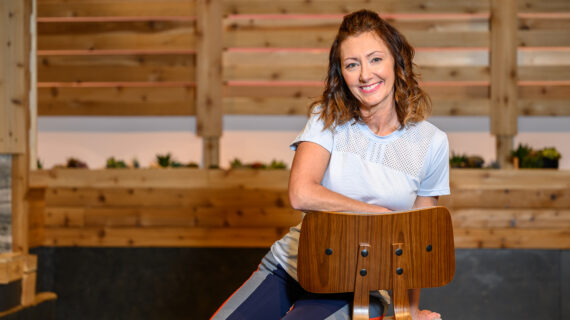Announcer:
The following program is a PBS Wisconsin original production.
Frederica Freyberg:
Democrats chart a new path under new maps and a bigger caucus, and the minds allegedly behind the false elector scheme come before the court.
I’m Frederica Freyberg. Tonight on “Here & Now, a first look at priorities for legislative leaders heading into a budget year. Trump lawyers face a Wisconsin judge. The status of the continually stalled Farm Bill, and how one UW campus is bucking the enrollment trends. It’s “Here & Now” for December 13.
Announcer:
Funding for “Here & Now” is provided by the Focus Fund for Journalism and Friends of PBS Wisconsin.
Frederica Freyberg:
Coming off the election, state legislative leaders prepare to roll up their sleeves for the next session and a biennial budget. Senior political reporter Zac Schultz sat down with Senate and Assembly leaders. This week, the Democrats who won big in the redistricting fight and are now looking to use their newfound seats to leverage policy changes. First up, Assembly Minority Leader Greta Neubauer.
Zac Schultz:
Looking back at 2024, what stands out at you as some of the more significant moments of the year?
Greta Neubauer:
So for over a decade, we have been working to get fair maps in Wisconsin, and that happened at the beginning of 2024. We were really pleased to be able to run last cycle on competitive maps that had a whole lot of districts that were, of course, very close. It’s really good for our democracy and it’s good for the voters to have more choice. And we saw that those maps had a significant impact on the election cycle. We were able to pick up ten seats as the Assembly Democrats and the Senate picked up several as well on the Democratic side. So we’re really pleased to see the numbers get a lot closer in both chambers. We, of course, are always working towards the majority, but we got pretty far in one cycle and we are going to use that new power to have real wins for our constituents in the coming legislative cycle.
Zac Schultz:
When speaking just for legislative Democrats. Is it fair to say the redistricting was probably the most significant moment of the decade?
Greta Neubauer:
I think it’s certainly up there. Yeah.
Zac Schultz:
Can it be overstated what this changes in the building?
Greta Neubauer:
No, I don’t think it can. I mean, in terms of the elections as you and I’m sure many of your viewers know, it was near impossible for Democrats in the Assembly and Senate to get a majority under the old maps, despite often getting about 50% of the vote, right? Sometimes over, sometimes a little under. And so now when we get 50% of the vote, right, that should yield close to 50% of the seats. And that’s a very good thing. We really did not have a functioning democracy here when it came to the state legislature. And so now we’ve got a number of members who are going to be serving in this body in the upcoming year, who are on the red side and the blue side, who are in very close seats, and they’re going to be looking over both shoulders, right. And they’re going to know that they’ve got an election in two years, and voters are going to expect them to deliver. They’re going to expect them to work hard on their behalf and not play partisan games, right, which often dominated in this building in the last decade. And I think that’s going to be a really good thing. I’m hopeful that we’re going to see a really productive bipartisan session.
Zac Schultz:
How does — how long does it take for that culture to shift because in way back before the first set of gerrymandered maps in 2010, you know, the older members taught new members how to work in the Capitol. But most of the existing members have only lived under that strict, gerrymandered partisan divide. So what will it take for new members to understand and work with new people about how does compromise legislation look like?
Greta Neubauer:
Yeah, it’s a really good question. I guess the first thing I’ll say is we have 23 new Assembly Democrats this year. That’s actually a majority of our caucus that’s going to be new legislators. Many of them, of course, coming from local government or other backgrounds where they were interacting with the Legislature. So they know a little bit about it. But I think it’s a really good thing that we have so many new people coming in, because I think that is going to help with this culture shift in really a new era for the Legislature. We only have one member who served in the majority, and that’s Chris Sinicki. And so she, I’m sure, is going to be helping our caucus understand what it was like to really be in a different position. But I will say that last session, things already started to change, right? With new maps coming in, we saw much more negotiation. We saw bipartisan legislation on housing and the Brewers and shared revenue. And I think we’re going to see that only increase. But we did get some practice last session in those negotiations, working with our colleagues and trying to get some big things done.
Zac Schultz:
Once again, we’re coming into a budget season with a large surplus in the state. Republicans have already talked about there has to be a tax cut. What kind of a tax cut could you expect Democrats to actually vote for?
Greta Neubauer:
Yeah. So in the last legislative session, we put forward alongside the governor, right, a middle class working families tax cut. We are very happy to have conversations about doing something like that again. We do have a significant surplus. And we also know that many people are struggling to make ends meet in Wisconsin due to recent inflation. And so we’re going to engage in those conversations in good faith. I would say that the challenge is that Republicans keep coming forward with policy proposals on tax cuts that are really about benefiting the richest people in Wisconsin and corporations. And that’s just not something that we’re interested in doing. We want a tax cut that is going to put money in the pockets of people who really need it. And we are looking forward to those conversations.
Zac Schultz:
The last four year, we’ve had a Biden administration that sent a lot of funds into the state of Wisconsin. What are you expecting from a Trump administration, especially since they’ve talked about cutting federal agencies or some of the money that flows into the state?
Greta Neubauer:
Yeah, I think we need to be prepared to take care of ourselves in many ways. I expect that some federal funds will have strings attached that we don’t want, and we are going to need to do everything we can to support our local governments and our schools and our higher education institutions to continue to function and to provide great services to their students and the people who live in Wisconsin. And that’s going to be a big discussion in the state budget, right? I think we’re going to really need to think about how we’re going to invest in our schools and how we’re going to make sure that we are starting — giving each kid in Wisconsin the opportunity to start life on a strong footing. The Legislature has not done its part in the past, and I don’t think that our schools are going to get bailed out by the federal government. So I’m hoping we can have a really robust conversation and see significantly increased investment in our schools in the coming budget.
Zac Schultz:
Representative Neubauer, thanks for your time.
Greta Neubauer:
Always great to speak with you. Thank you.
Frederica Freyberg:
Next up, Senate Minority Leader Dianne Hesselbein, who says that because Democrats are no longer in the super minority, she hopes her party can work more closely with Republicans who need their votes.
Zac Schultz:
So you are new in this position. A year ago, you were not the minority leader in the Senate. What have you learned in your first year running this caucus, you know, few months in session and then the election?
Dianne Hesselbein:
Yeah. Well, conversations matter and treating people with respect matters. And I think that’s what I’ve always tried to do first elected to this in 2012 and I will continue to do that. I really feel that you can disagree without being disagreeable. That’s something that my whole, my whole caucus can lead with.
Zac Schultz:
So walk me through the election and the results for you.
Dianne Hesselbein:
I am so excited. I mean it was — I was just so disappointed on that night with what was happening with President Trump and his gains in so many states, including ours. But at the same time, during that same time, we were getting wins. And so we’d find out like, oh, Jamie Wall won Green Bay or this one won or Sarah Keyeski won. So at the same time when inwardly I was like, oh my gosh, this is terrible for the United States, the Senate Democrats, in a very tough Trump election year, we won. We wanted to win all five seats that we set forth to win, and we did it. And we flipped four of those.
Zac Schultz:
When the original narrative was, you know, Republican blowout, have you recalculated that? Have people started to reevaluate what actually happened in Wisconsin on election night?
Dianne Hesselbein:
I think they have. I think they realize that in a Trump wave, we were able to hold on to Tammy Baldwin, which is extremely important in the U.S. Senate, and then making gains in both the Wisconsin State Senate and the Wisconsin State Assembly is really huge. And I really think that’s because we finally have fair maps, and people finally had a chance at the ballot box to really vote how they wanted to.
Zac Schultz:
So we obviously have a budget coming up next year. What does the new makeup of the Senate mean in terms of Democrats maybe having a voice in the budget, as opposed to relying on Governor Evers and just protecting his veto?
Dianne Hesselbein:
So we’re now no longer in the super minority, right? The Republicans no longer have a supermajority in the Senate. And with 18 Republicans and 15 Democrats, I’m really hoping that we can work in a bipartisan fashion the entire way through the state budget. So maybe for the first time since I was first elected in 2012, maybe I can get to a yes to a vote for a budget would be really exciting. I think the Republicans are going to need our votes to get through. And certainly I have an open-door policy to try to make that happen.
Zac Schultz:
At what stage in the process do you think Democrats are most likely to be involved in that?
Dianne Hesselbein:
Well, I’ve already had a meeting with Senator LeMahieu and Senator Falkowski this week, and we’re going to continue to have those conversations starting in January.
Zac Schultz:
Because the original Joint Finance process usually takes quite a while, and that’s where a lot of the work gets done. But then there is that kind of free for all when it comes back to the floor. And you can offer some of your own amendments. Do you think by then it’ll be too late to change what’s already in the bill?
Dianne Hesselbein:
It might be but they also might need our votes to get things done, so we’ll see. I mean, we’re going to be talking the entire way through and hopefully get to a finished package that we can all live with, or at least the majority of us can live with and be happy about. But we’ll see. We’re certainly open to however we can maneuver so we can get something positive to the governor’s desk.
Zac Schultz:
In past budgets, Senator LeMahieu has been able to allow some of his more conservative members to vote no against the budget because he’s had that that flexibility in terms of his raw numbers. Now, he doesn’t. Do you anticipate that means he’ll be leaning more on them, or do you think he’ll be leaning more on Democrats?
Dianne Hesselbein:
I think it will be both. I think he’s going to have a hard row to navigate. But I know, like I said, I have an open-door process and I’m willing to help out where I can.
Zac Schultz:
Looking at the national perspective, there’s been a lot of money flowing from the Biden administration into Wisconsin. What shifts do you expect to occur with the Trump administration?
Dianne Hesselbein:
Well, I’m worried about what the Trump administration is going to do, but I’m hoping that we can continue working together and getting some things done for the people in the state of Wisconsin. I think Sean Duffy being in transportation is going to be — could be helpful for us. I don’t know him personally. I’ve never met him, but I think somebody that knows Wisconsin is good for us.
Zac Schultz:
There has been talk at the Trump level to eliminate the Department of Education altogether and, “return education to the states.” What would that look like and how would that play out in terms of the Legislature having to take some steps?
Dianne Hesselbein:
Yeah, I’m curious of how that would look, because certainly, you know, we get federal money from the federal government for education. And honestly, our IEPs that we do with federal protection for kids that have special needs and special disabilities to help them moving forward in their educational process. So I have a lot of questions if they return things to the states. I know that in our state, Superintendent Jill Underly is doing a really good job, but I worry about what’s going on in other states in Alabama and Texas and where their scores are really not doing well. And so I’m kind of worried what that would do.
Zac Schultz:
Senator Hesselbein, thanks for your time.
Dianne Hesselbein:
Thank you very much.
Frederica Freyberg:
For next week, we’re scheduling their Republican counterparts.
Turning to the 2020 election, lawyers at the center of the false elector case from the 2020 election had an initial appearance in Dane County Court this week.
Judge:
I do find there is probable cause to proceed under the amended complaint, as it was filed December 10th.
Frederica Freyberg:
Jim Troupis and two other men were acting as lawyers for the Trump campaign in 2020 when they arranged for ten Republicans to sign papers claiming they were the electors from Wisconsin. The lawyers have each been charged with 11 felony counts of forgery. Troupis is a longtime Republican lawyer from Wisconsin. The electors have not been charged, with each claiming they were duped by Troupis and the Trump campaign into signing, believing the paperwork would only be needed if Trump won his legal cases to overturn the election. Instead, the false electoral documents were sent to Washington, where Trump’s staffers attempted to use Wisconsin Senator Ron Johnson to get the false electors to Vice President Mike Pence on January 6th. Troupis is calling the charges “lawfare” and says they are an attack on democracy. The three defendants are free on signature bonds and will be back in court for a preliminary hearing in January.
Environmental groups and the Bad River tribe in northern Wisconsin this week formally challenged wetland and waterway permits the DNR issued to reroute the Enbridge oil pipeline that traverses tribal land. Bad River Tribal Chairman Robert Blanchard expressed worries about the pipeline damaging the ecosystem.
Robert Blanchard:
We do have a annual harvest of our wild rice, which is, which grows along the rivers here in Bad River and in Lake Superior, and we hunt, we fish, and we gather a lot of our, our medicines that that we use to heal ourselves here. And, and if they are — something happens to them, you know, our people are going to feel that, you know. We have a lot at stake here.
Frederica Freyberg:
Farmers in Wisconsin and across the nation wait and watch the unfolding and hurried negotiations in Washington over a new Farm Bill. The old Farm Bill needs to be extended by December 20 or key farm programs expire by the end of the year. Now, 80% of the roughly $500 billion Farm Bill goes to nutritional aid for low-income people. The rest includes price supports, crop insurance and other programs directed at producers. It’s a lot of money and a lot of programs. Here to weigh in on the progress is Tyler Wenzlaff of the Wisconsin Farm Bureau Federation. And thanks very much for being here.
Tyler Wenzlaff:
Thank you.
Frederica Freyberg:
So what are the most important parts of the Farm Bill for Wisconsin producers?
Tyler Wenzlaff:
Yeah. So some of the priorities that Wisconsin Farm Bureau has been advocating for is changes to reference prices. As you alluded to earlier, we would like to see a change in the DMC program, which is a dairy margin program, changing the tier one coverage from 5 million pounds to 6 million pounds, and then also changes to the dairy business initiative. And so, right now it’s funded at $20 million. With the help of Senator Baldwin and Congressman Van Orton, we’d like to see that money moved to $36 million.
Frederica Freyberg:
So you talked about a lot of programs that might be kind of like a foreign language to a lot of viewers, but it has to do with price support. Is that right?
Tyler Wenzlaff:
For sure. Yeah. The dairy margin coverage program is something that covers small to medium farms. And so Wisconsin has the highest participation rate in the country at over 80%. And so we’d like to make sure that as our dairy herds become a little bit bigger, this program modernizes with those programs, with those farms.
Frederica Freyberg:
So what is the status of talks around this in Washington right now?
Tyler Wenzlaff:
Yeah. So negotiations are hot and heavy right now. So we could see a deal by the end of the weekend. And Congress has been very good at pushing off things. They’ve gotten to an extreme level right now where we only have four days left in the congressional session. And so what we’re hoping for is a clean extension into next year. And that’s probably the most likely scenario. And we hope to have something confirmed by the end of the weekend and voted on next week.
Frederica Freyberg:
What happens if nothing is confirmed or voted on?
Tyler Wenzlaff:
Yeah. So Wisconsin probably faces the most dire situation because of our reliance on dairy. We’re facing what’s called the dairy cliff if we don’t have something done by the end of the year. So if we don’t have an extension done, USDA would be forced to revert back to permanent law, which is from 1949. And so they would have to begin purchasing dairy products at accelerated levels. So that would be at twice the price of what we see right now. So instead of farmers getting $25, $24 per hundredweight for their products, they’d see $50. And so while that may sound like a boon to Wisconsin farmers, the chaos that it would put into markets would outweigh any kind of benefits.
Frederica Freyberg:
But you think that there will be a deal for the one year extension by the end of the weekend?
Tyler Wenzlaff:
Yeah, it sounds like, you know, when you talk to different congressional offices, the most likely scenario is a clean extension into next year with a continuing resolution to fund the government that has ad hoc disaster and economic assistance as well.
Frederica Freyberg:
So it appears that the incoming Trump administration wants to deeply cut spending. What concerns are there for spending in the Farm Bill?
Tyler Wenzlaff:
Yeah, so that’s one of the things that we really have been taking a look at is what does that mean for SNAP benefits because while those support those that go to the grocery store that are low income, it also supports Wisconsin farmers. They’re buying Wisconsin farmer products. And so we hope that we can take a look at and make sure that those reforms are moderated in the future.
Frederica Freyberg:
Because again, SNAP is kind of the former food stamp program.
Tyler Wenzlaff:
Yep, yep. Exactly.
Frederica Freyberg:
And again, farmers’ products go to stores for people to buy that.
Tyler Wenzlaff:
Yep. Yep. Definitely.
Frederica Freyberg:
That’s the connection.
Tyler Wenzlaff:
The connection between, you know, the nutrition program and SNAP and Wisconsin dairy farmers is very deep and something especially in Wisconsin is very — something that we have to be very mindful of.
Frederica Freyberg:
Something else in the headlines right now is around raw milk. And I have two questions on that for you. First, what is your position on the consumption of raw milk and second, what about the testing requirements that are now being rolled out for dairy farmers around testing raw milk against things like bird flu?
Tyler Wenzlaff:
Sure. So Wisconsin Farm Bureau has a policy that we believe right now, it is up to the consumer whether they want to purchase raw milk or get that from the farm. We would say that it is not the best idea to do. There are some health concerns that come with that, and it’s probably better for the consumer to get pasteurized milk from the grocery store, but that is up to the consumer to decide. When it comes to testing for bird flu, USDA is in the process of rolling out new mandates for testing. They are beginning with the six pilot program states that they started with a couple of months ago. Wisconsin will begin testing over the next couple of months, and we’re working with USDA and our Department of Agriculture and Trade and Consumer Protection to make sure those details are worked out and how that testing will be done, because Wisconsin isn’t like a lot of other states where we only have 80 dairy farms. We have over 5,000. And so testing each one of those is going to be a hefty lift.
Frederica Freyberg:
Yeah. Tyler Wenzlaff, thanks very much.
Tyler Wenzlaff:
Yeah. Thank you.
Frederica Freyberg:
UW schools separate from the flagship in Madison, mostly see falling enrollment and budget woes. As a result, some branch campuses have been closed altogether, resulting in layoffs. Some majors have been eliminated, and there has been belt tightening all around. The UW administration is asking the Legislature for $855 million in the next two-year budget to shore up the system. That’s expected to be a fight with Republican legislators. Amidst all of this though, a bright spot. UW-Green Bay this fall saw record high enrollment of 7,000 full-time students and eliminated its deficit last year. How did they do it? We turn to UW-Green Bay Chancellor Michael Alexander. Ahead of that, we should note PBS Wisconsin is part of UW-Madison. And Chancellor, thanks very much for being here.
Michael Alexander:
Thanks very much for having me.
Frederica Freyberg:
So that big question is how did you boost enrollment to these levels?
Michael Alexander:
Well, I think we’re really trying to redefine how we view who a student could be. So we really view a student as anyone who wants to learn. And we feel that as a regional comprehensive, we should be of value to every citizen in northeast Wisconsin, whether they be, you know, all the way from pre-K, all the way through retirement, right, that there should be some way that as a regional comprehensive, we are serving people who want to continue their education. So we work everything from a lot of college credit in high school, our dual enrollment with students. Obviously, we have traditional students who come live on campus. We have a ton of commuters. We have a ton of people who are in the workforce who come with us, and we teach over 85,000 people a year in noncredit work to help them advance their careers and their lives.
Frederica Freyberg:
So do you feel as though UW-Green Bay has — is starting to become known as a place where people in different stages of their life can go and get that degree?
Michael Alexander:
I hope so. I think we are doing everything we can to make sure that we are viewing education through the eyes of a student. In other words, what makes it convenient for a student to advance their life through education as opposed to just thinking about what may be convenient for us. So we’re adapting the university as fast as we can to live in that reality in the modern world, where people have complicated lives and we need to meet them where they are to make sure they can have education, be a part of it.
Frederica Freyberg:
Do you feel as though other campuses will be using yours as a model example?
Michael Alexander:
I don’t know, but I know that every campus in the UW system is doing really amazing work, and all of us have very different circumstances based on location and all our different things. I think I’m really, really proud to have amazing colleagues across the system that are doing an amazing job educating students.
Frederica Freyberg:
At the same time, your Marinette branch campus closed in-person classes and UW-Green Bay eliminated some majors, including theater. What do you say to people who say campuses are now just trying to kind of turn out industry-specific workers rather than focus on college attainment in the liberal arts for its own sake?
Michael Alexander:
Well, I think that’s a really great question. I think that we believe very strongly that the reason you come to a university is because you’re going to learn more than just a skill for a job. You’re going to learn skills that will help you throughout your life and your career. That has to be skills that you learn through the liberal arts, like communication, like understanding how to talk to people who have differing ideas than you do. So important in the modern world, and learning through things like theater. So we are looking very carefully about how to make sure we can get more students who take things like theater. It doesn’t mean we have to have a major in it. We believe, though, that those liberal arts classes are core to who we are, and Marinette is a great example of this. Marinette, we have a technical college that’s right next door to us in Marinette, and we still have options for education in Marinette for students who need the university for an access point to their classes. But we’ve really invested in the theater there, and the theater in Marinette now is thriving. It’s sold-out performances. It has really grown under UW-Green Bay, and we’re really proud of that. It’s — I think we have to look at education differently and we view Marinette broadly as a success, even though we don’t have in-person classes anymore.
Frederica Freyberg:
So you had to spend down your reserves, I understand, to get rid of the deficit. How much does UW-Green Bay need an infusion of state dollars to keep going, even with your enrollment success?
Michael Alexander:
I think it’s really important that the state look at how it’s investing in education to make sure that we’re preparing the workforce we need for the future. And if you look at this, and if you look, there’s a Georgetown study that talked about this, about what good jobs will look like. And by good jobs, it’s not white collar, blue collar I’m talking about. It’s just jobs that are going to be able to pay well. And more and more of those as we look into the next decade, are going to require education beyond high school. And it’s certainly possible to have a rewarding career and not have any experience beyond high school. It’s just the odds of having a high paying job are less, right? And so how do we make sure that we’re putting people and allowing people to evolve in the workforce as the workforce skills you need change so quickly in the current age? If you think about even AI and what kind of skills we will need in the future, this is really important.
Frederica Freyberg:
All right. Chancellor Michael Alexander, we’ll leave it there. Thank you very much.
Michael Alexander:
Thank you for having me.
Frederica Freyberg:
For more on this and other issues facing Wisconsin, visit our website at PBSWisconsin.org and then click on the news tab. That’s our program for tonight. I’m Frederica Freyberg. Have a good weekend.
Announcer:
Funding for “Here & Now” is provided by the Focus Fund for Journalism and Friends of PBS Wisconsin.
Search Episodes
Related Stories from PBS Wisconsin's Blog

Donate to sign up. Activate and sign in to Passport. It's that easy to help PBS Wisconsin serve your community through media that educates, inspires, and entertains.
Make your membership gift today
Only for new users: Activate Passport using your code or email address
Already a member?
Look up my account
Need some help? Go to FAQ or visit PBS Passport Help
Need help accessing PBS Wisconsin anywhere?

Online Access | Platform & Device Access | Cable or Satellite Access | Over-The-Air Access
Visit Access Guide
Need help accessing PBS Wisconsin anywhere?

Visit Our
Live TV Access Guide
Online AccessPlatform & Device Access
Cable or Satellite Access
Over-The-Air Access
Visit Access Guide
 Passport
Passport


















Follow Us